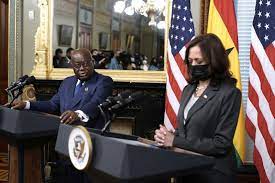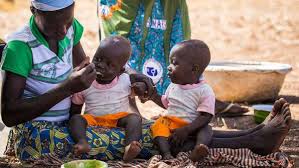U.S. Vice President Kamala Harris will meet with Ghanaian President Nana Akufo-Addo on Monday in an effort to show the West African leader support as she deals with mounting inflationary unrest and new security worries in the region.
In an effort to increase American influence in Africa at a time when China and Russia have entrenched interests of their own, Harris is just starting a week-long tour to the continent that will also take her to Tanzania and Zambia.
Before the COVID-19 outbreak, Akufo-Addo presided over one of the most rapidly expanding economies in the world. Yet, prices for food and other needs have been rising rapidly, and the nation is in debt because it is finding it difficult to make payments.
Also, there has been an uptick in the irregular conflict in Ghana’s north, which borders the more unstable Burkina Faso and the Sahel, where local affiliates of al-Qaida and the Islamic State group have been active.
Rama Yade, senior director of the Africa Center at the Atlantic Council, declared that “Ghana is going through a very difficult time.”
According to her office, Harris will announce $139 million in US aid for Ghana. Congress will need to approve some of the money, which could be challenging given the stark party divide over the federal budget. The Treasury Department also intends to send a consultant to Accra to assist in managing Ghana’s massive debt.
Additional initiatives aim to decrease child labor, enhance weather forecasts, aid local musicians, and prevent illness outbreaks.
In an effort to strengthen their defenses, the US has already dispatched troops to train the militaries of Ghana and other nations. However, other nations have turned to the Wagner Russian mercenary force, which has been present in Africa as well as on the front lines of Russia’s conflict in Ukraine.
There are worries that Wagner will also deploy to Burkina Faso, where France also halted its military presence. Wagner started operating in Mali when it drove out French forces stationed there. Ghana recently claimed that the leaders of Burkina Faso, who seized control in a coup last year, had already turned to Wagner for assistance, which Akufo-Addo described as “unsettling.”
In order to announce additional support for the region, U.S. Secretary of State Antony Blinken recently traveled to Niger, which borders Mali and Burkina Faso.
As a result of the relationship with Wagner, he continued, “We’ve seen countries find they are weaker, poorer, more insecure, and less independent.”
Russia’s own attempts to get a foothold in the region have disturbed Washington as well, despite China’s influence in Africa is a top worry for US foreign policy. Certain nations and the Soviet Union have had enduring relations.
In an effort to demonstrate that the West has been unsuccessful in isolating Moscow for its invasion of Ukraine, Sergey Lavrov, the Russian foreign minister, has traveled to the continent numerous times.
The United States is still playing catch-up in Africa, according to Samuel Ramani, associate fellow at the Royal United Services Institute, a defense, and security think tank based in London.
He continued, “It’s really unclear how Russia will truly be able to increase its influence over time. However, they are building a positive reputation for themselves right away.
Moscow’s overall investments in Africa “are very modest” in comparison to Washington’s, according to Mucahid Durmaz a senior analyst at Verisk Maplecroft; a global risk intelligence firm. However, he adds that Moscow has been successful in capitalizing on anti-Western sentiment in some regions of the continent.
The conflict in Ukraine has elevated the relevance of Africa in world politics and heightened the competition among superpowers for the backing of African governments and countries, he claimed.
Americans have avoided describing their strategy in terms of international conflicts since doing so may quickly alienate Africans who are leery of getting caught in the middle.
They are still wary of making the same mistakes they did during the Cold War era and becoming unintended casualties of global rivalry, Durmaz said.




















